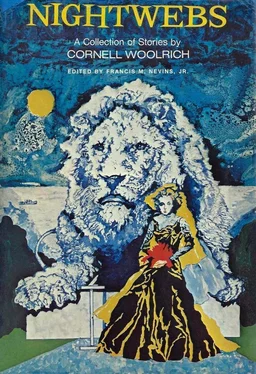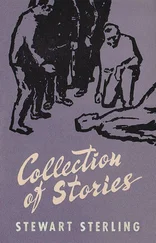But there was one thing had to be attended to right off, and that was the matter of ammunition. To the best of Lew’s calculations (and so much had happened that they were already pretty hazy) he had fired four shots out of the gun from the time he had taken it over from the dick on the roof. One at Tom, two in Rubin’s, and one on the street when they’d been after him. There ought to be two left in it, and if the immediate future was going to be like the immediate past, he was going to need a lot more than that. He not only didn’t know where any could be bought, he didn’t even know how to break the thing and find out how many it packed.
He decided a pawnshop would be about the best bet, not up here in the mid-town district, but down around the lower East Side or on the Bowery somewhere. And if they didn’t want to sell him any, he’d just blast and help himself.
He took a street car down as far as Chatham Square. He had a feeling that he’d be safer on one of them than on the El or the subway; he could jump off in a hurry without waiting for it to stop, if he had to. Also, he could see where he was going through the windows and not have to do too much roaming around on foot once he alighted. He was a little dubious about hailing a cab, dressed the way he now was. Besides, he couldn’t exactly tell a hackman, “Take me to a pawnshop.” You may ride in a taxi coming out of one, you hardly ride in a taxi going to one.
He went all the way to the rear end and opened the newspaper. He didn’t have to hunt it up. This time it had made a scare-head. “One-Man Crime Wave!” And then underneath, “Mad dog gunman still at large somewhere in city.” Lew looked up at the oblivious backs of the heads up forward, riding on the same car with Lew. Not one of them had given him a second glance when he’d walked down the aisle in the middle of all of them just now. And yet more than one must be reading that very thing he was at the moment; he could see the papers in their hands. That was he, right in the same trolley they were, and they didn’t even know it! His contempt for death was beginning to expand dangerously toward the living as well, and the logical step beyond that would be well past the confines of sanity — a superman complex.
Fortunately, he never quite got to it. Something within this same paper itself checked it, before it got well started. Two things that threw cold water over it, as it were. They occurred within a paragraph of each other, and had the effect of deflating his ego almost to the point at which it had been last night, before he’d touched that dead man’s face in the theater restroom. The first paragraph read: “The police, hoping that young Tom Lee might unknowingly provide a clue to the suspect’s whereabouts, arranged to have him released at Headquarters shortly after midnight. Detective Walter Daly was detailed to follow him. Daly trapped Stahl on the roof of a tenement, only to lose his balance and fall six stories during the scuffle that ensued. He was discovered unconscious but still alive sometime after the young desperado had made good his second escape, lying with both legs broken on an ash-heap in a vacant lot adjoining the building.”
That was the first shock. Still alive, eh? And he’d lost his balance, huh? A line or two farther on came the second jolt:
“Stahl, with the detective’s gun in his possession, had meanwhile made his way down the stairs and brutally shot Lee in his room. The latter was rushed to the hospital with a bullet wound in his neck; although his condition is critical, he has a good chance to survive...”
Lew let the thing fall to the floor and just sat there, stunned. Tom wasn’t dead either! He wasn’t quite as deadly as he’d thought he was; death wasn’t so easy to dish out, not with the aim he seemed to have. A little of his former respect for death came back. Step one on the road to recovery. He remembered that waiter at Rubin’s, flopping flat across the doorway; when he’d jumped over him, he’d definitely cringed — so he hadn’t finished him either. About all he’d really managed to accomplish, he said to himself, was successfully hold up a restaurant, separate a cab driver from his pants and his machine, and outsmart the cops three times — at the theater, on the roof, and in the Italians’ flat. Plenty for one guy, but not enough to turn him into a Manhattan Dillinger by a long shot.
A lot of his self-confidence had evaporated and he couldn’t seem to get it back. There was a sudden, sharp increase of nervousness that had been almost totally lacking the night before.
He said to himself, “I need some bullets to put into this gun! Once I get them, I’ll be all right, that’ll take away the chills, turn on the heat again!”
He spotted a likely looking hockshop, and hopped off the car.
He hurried in through the swinging doors of the pawnshop and got a lungful of camphor balls. The proprietor came up to him on the other side of the counter. He leaned sideways on his elbow, tried to stop the shaking that had set in, and said: “Can you gimme something to fit this?” He reached for the pocket he’d put the gun in.
The proprietor’s face was like a mirror. Expectancy, waiting to see what it was; then surprise, at how white his customer was getting; then astonishment, at why Lew should grip the counter like that, to keep from falling.
It was gone, it wasn’t there any more. The frisking of the rest of his pockets was just reflex action; the emptiness of the first one told the whole story. He thought he’d outsmarted that Italian she-devil; well, she’d outsmarted him instead! Lifted the gun from him while she was busy seeming to straighten this old red sweater of her husband’s on him. And the motive was easy to guess: So that Mario wouldn’t be running any risk when he tried to blackmail Lew out on the street for the rest of the five hundred, like she’d told him to. Lew had walked a whole block with him, ridden all the way down here, and never even missed it until now! A fine killer he was!
He could feel what was left of his confidence crumbling away inside him, as though this had been the finishing touch it needed. Panic was coming on. He got a grip on himself; after all, he had five hundred in his pocket. It was just a matter of buying another gun and ammunition, now.
“I wanna buy a revolver. Show me what you’ve got.”
“Show me your license,” the man countered.
“Now, listen,” he was breathing hard, “just skip that part of it. I’ll pay you double.” He brought out the money.
“Yeah, skip it,” the proprietor scoffed. “And then what happens to me, when they find out where you got it? I got myself to think of.”
Lew knew he had some guns; the very way he spoke showed he did. He sort of broke. “For the love of Gawd, lemme have a gun!” he wailed.
“You’re snowed up, mac,” he said. “G’wan, get out of here.”
Lew clenched his teeth. “You lemme have a gun, or else—” And he made a threatening gesture toward the inside of his coat. But he had nothing to threaten with; his hand dropped limply back again. He felt trapped, helpless. The crumbling away kept on inside him. He whined, pleaded, begged.
The proprietor took a step in the direction of the door. “Get out of here now, or I’ll call the police! You think I want my license taken away?” And then with sudden rage, “Where’s a cop?”
Police. Cops. Lew turned and powdered out like a streak.
And Lew knew then what makes a killer; not the man himself, just the piece of metal in his hand, fashioned by men far cleverer than he. Without that, just a snarling cur, no match even for a paunchy hockshop owner.
Lew lost track of what happened immediately after that. Headlong, incessant flight — from nothing, to nothing. He didn’t actually run, but kept going, going, like a car without a driver, a ship without a rudder.
Читать дальше












